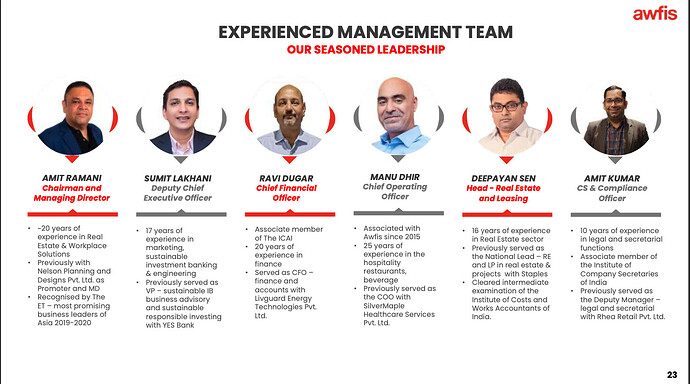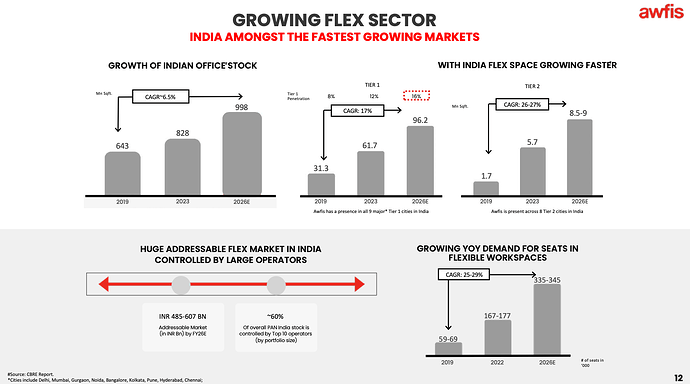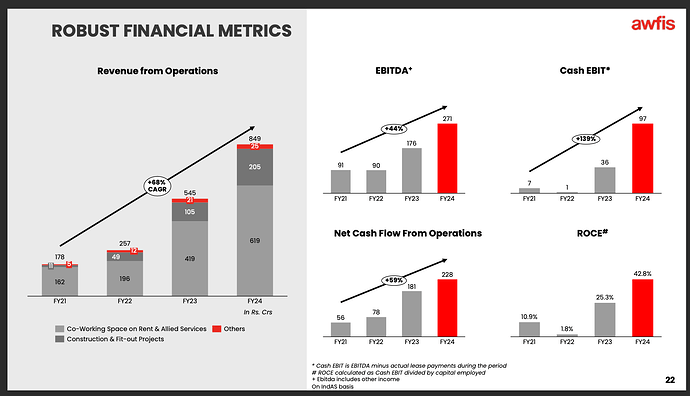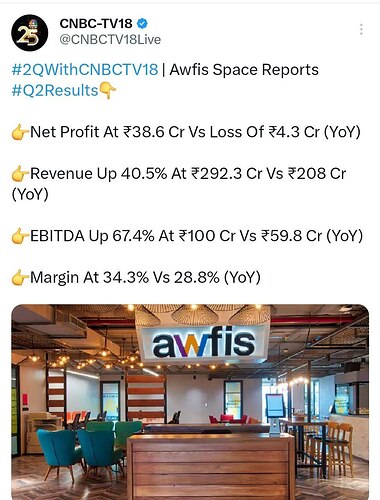Detailed Investment Thesis for Awfis Space Solutions Limited
1. Introduction
Awfis Space Solutions Limited, a frontrunner in India’s flexible workspace industry, has rapidly established itself as the largest provider of coworking spaces in the country. Founded in 2015 by Amit Ramani, the company has grown to operate 181 centers, offering over 110,000 seats across approximately 5.6 million square feet of chargeable area. As the demand for flexible office spaces continues to surge, Awfis is strategically positioned to capitalize on this trend. This investment thesis provides a comprehensive analysis of Awfis’s business model, financial performance, industry landscape, growth prospects, risks, and valuation.
2. Founder and Leadership
Amit Ramani, the founder and Chairman & Managing Director of Awfis, is a seasoned professional with over 20 years of experience in the real estate and workspace solutions industry. Before founding Awfis, he was the Promoter and Managing Director of Nelson Planning and Designs Pvt. Ltd., where he gained extensive expertise in commercial real estate and workplace strategies. Under his leadership, Awfis has not only become the largest flexible workspace operator in India but also the first to go public in the flexible space industry.
Supporting Ramani is a strong leadership team, including Sumit Lakhani, the Deputy Chief Executive Officer, who brings 17 years of experience in marketing and sustainable investment banking, and Ravi Dugar, the Chief Financial Officer, who has 20 years of experience in finance. Together, they have steered Awfis through rapid growth and successfully positioned the company as a leader in the flexible workspace industry.
3. Industry Overview
The flexible workspace industry is experiencing explosive growth globally, with India emerging as one of the fastest-growing markets. The rise of startups, SMEs, and the increasing demand for scalable office spaces by large corporations are driving this growth. The Indian flexible workspace market is projected to expand at a CAGR of approximately 26-27% from 2019 to 2026, with the total office stock expected to grow at a CAGR of around 6.5% during the same period.
Several factors are contributing to this growth:
-
Urbanization and Economic Growth: India’s rapid urbanization and robust economic growth have led to increased demand for commercial office spaces. However, traditional office leases often require long-term commitments and substantial upfront costs, which can be prohibitive for many businesses, particularly in volatile economic environments.
-
The Gig Economy and Remote Work: The rise of the gig economy, coupled with the increased adoption of remote work due to the COVID-19 pandemic, has significantly boosted demand for flexible workspaces. Companies are increasingly seeking cost-effective, adaptable office solutions that allow them to scale operations up or down quickly based on business needs.
-
Corporate Real Estate Strategies: Large corporations are also embracing flexible workspaces as part of their real estate strategies. These spaces offer a means to decentralize operations, enhance employee satisfaction through modern amenities, and reduce real estate costs by avoiding long-term lease commitments.
With India’s flexible workspace penetration expected to reach 15.5% of total commercial real estate (CRE) absorption by 2026, up from approximately 8% in 2019, the industry presents significant growth opportunities for leading players like Awfis.
4. Business Model and Strategy
4.1 Managed Aggregation (MA) Model
Awfis operates on a unique Managed Aggregation (MA) model, where the company partners with space owners to share capital expenditure and profits. This model is a significant departure from traditional straight lease (SL) models, where companies have to pay fixed rents regardless of their occupancy rates.
Key Attributes of the MA Model:
-
Capital Efficiency: The MA model significantly reduces capital expenditure, as a large portion of the investment is borne by the space owners. This allows Awfis to expand its footprint rapidly without the burden of heavy upfront costs.
-
Revenue Sharing: The model operates on a minimum guarantee (MG) or profit-sharing basis, whichever is higher, thereby aligning the interests of both Awfis and the space owners. This shared-risk approach ensures that both parties benefit from the success of the centers.
-
Higher ROCE: The MA model has enabled Awfis to achieve a remarkable annualized ROCE of 53% as of Q4 FY24, significantly higher than what would be achievable under the SL model.
4.2 Product Offerings
Awfis has developed a comprehensive suite of products under its Workspace Solutions Platform:
-
Flexible Workspaces: This includes hot desks, fixed seats, and cabin spaces tailored to meet the needs of freelancers, SMEs, and large corporates.
-
Enterprise Solutions: Awfis provides customized, built-to-suit office spaces for enterprises, offering commercial fit-out services that blend function and design.
-
Mobility Solutions: Awfis offers day passes, virtual offices, and meeting rooms, providing flexibility for businesses and individuals who require short-term office solutions.
-
Facility Management: The company also provides end-to-end facility management services, ensuring seamless operations and maintenance of office spaces.
These diverse offerings allow Awfis to cater to a wide range of clients, ensuring a steady and diversified revenue stream.
4.3 Geographic Footprint
Awfis operates across 17 cities in India, including all nine major Tier 1 cities and eight Tier 2 cities. This extensive network enables the company to efficiently meet the demand for flexible workspaces in key micromarkets and Central Business Districts (CBDs) across the country. The company’s strategic expansion into Tier 2 cities positions it to tap into emerging markets where demand for modern office infrastructure is on the rise.
5. Financial Performance
Awfis has demonstrated strong financial performance over the years, driven by its innovative business model and strategic market positioning. Below is a table summarizing the key financial metrics for the company:
| Financial Metric | FY21 | FY22 | FY23 | FY24 |
|---|---|---|---|---|
| Revenue from Operations (INR Cr) | 178 | 257 | 545 | 849 |
| EBITDA (INR Cr) | 91 | 90 | 176 | 271 |
| EBITDA Margin (%) | 51.1 | 32.3 | 31.1 | 31.0 |
| PAT (INR Cr) | -43 | -57 | -47 | -18 |
| Net Cash Flow from Operations (INR Cr) | 56 | 78 | 181 | 228 |
| ROCE (%) | 10.9 | 1.8 | 25.3 | 43.8 |
5.1 Revenue Growth
Awfis’s revenue from operations has grown at an impressive CAGR of 68% from FY21 to FY24, reaching INR 849 crores in FY24. This growth has been driven by the company’s expanding network of centers and its ability to maintain high occupancy rates.
5.2 Profitability
Awfis has consistently improved its profitability metrics. The company’s EBITDA margin stood at 31% in FY24, reflecting a 54% year-on-year increase in absolute EBITDA to INR 271 crores. The managed aggregation model has been a key driver of these robust margins, as it allows Awfis to operate with lower fixed costs compared to traditional leasing models.
Moreover, the company has achieved positive PAT (Profit After Tax) in Q4 FY24, marking a significant milestone in its financial journey. The company’s ability to turn profitable, despite the capital-intensive nature of the commercial real estate industry, is a testament to its efficient operational management and strategic foresight.
5.3 Cash Flow and Capital Efficiency
Awfis’s cash flow from operations has been strong, with net cash from operating activities increasing to INR 228 crores in FY24 from INR 181 crores in FY23. The company’s focus on capital efficiency is evident in its managed aggregation model, which has resulted in a lower capital expenditure per seat compared to traditional models. The company’s ROCE has improved significantly, reaching 43% in FY24, up from 25% in FY23.
6. Growth Strategy
Awfis’s growth strategy is centered around expanding its network of centers, enhancing its product offerings, and improving operational efficiency.
6.1 Network Expansion
The company plans to continue its aggressive expansion into new and existing markets. Awfis is particularly focused on expanding into key micromarkets in Tier 1 cities and emerging Tier 2 cities, where demand for flexible workspaces is expected to grow rapidly. The company’s target is to increase its network to over 200 centers and 127,000 seats by the end of FY24.
6.2 Product and Service Enhancement
Awfis aims to enhance its product and service offerings by increasing its focus on Awfis Transform (customized workspaces), Awfis Care (facility management), and allied services. The company’s goal is to cater to a wider range of clients, tailoring solutions to meet their specific needs. This customer-centric approach is expected to drive higher occupancy rates and increase client retention.
6.3 Operational Efficiency
Awfis is committed to improving its operational efficiency by streamlining operations and leveraging new-age technologies. The company has already established a strong vendor base, which has enabled it to achieve higher cost efficiencies. Going forward, Awfis plans to further optimize its operations to enhance profitability and deliver superior value to its stakeholders.
7. Valuation
7.1 Valuation Multiples
To assess whether Awfis is overvalued, undervalued, or fairly valued, key valuation multiples such as EV/EBITDA and P/E ratios are considered.
-
EV/EBITDA Ratio: With a strong EBITDA growth and high margins, the EV/EBITDA ratio for Awfis is approximately 15-18x, which is in line with or slightly above the industry average for high-growth companies in the flexible workspace sector.
-
P/E Ratio: Given Awfis’s recent profitability, the P/E ratio might initially appear high. However, as the company scales and sustains profitability, the ratio is expected to normalize, reflecting the true earning potential.
7.2 My take on Valuation
Considering the strong financial performance, growth prospects, and market positioning, Awfis appears to be fairly valued at its current market price. The stock reflects the company’s robust current performance and anticipated growth. As Awfis continues to expand and improve profitability, the valuation is likely to hold or even appreciate, provided market conditions remain favorable.
8. Risks
Despite its strong market position and growth potential, Awfis faces several risks that could impact its business performance.
8.1 Market Risks
The flexible workspace industry is highly sensitive to macroeconomic conditions. Any downturn in the Indian economy could lead to reduced demand for office spaces, including flexible workspaces. Additionally, the growth of the industry is closely tied to the performance of sectors such as IT, BFSI (Banking, Financial Services, and Insurance), and startups, which are significant clients for Awfis. If these sectors experience a downturn, it could adversely affect Awfis’s occupancy rates and profitability.
8.2 Competitive Risks
The flexible workspace market in India is competitive, with both local and international players vying for market share. Major competitors like WeWork and Regus have strong brand recognition and substantial resources. Awfis will need to continually innovate and expand its offerings to maintain its leadership position. Failure to differentiate itself from competitors could lead to pricing pressures and reduced market share.
8.3 Operational Risks
The company’s Managed Aggregation (MA) model, while capital-efficient, also comes with certain risks. The success of this model depends on maintaining strong relationships with space owners and ensuring mutually beneficial agreements. Any disruptions in these partnerships or disagreements over profit-sharing could impact Awfis’s profitability. Additionally, as the company scales its operations, managing the quality and consistency of service across multiple locations becomes increasingly challenging.
8.4 Regulatory Risks
Changes in government regulations, particularly those related to commercial real estate and leasing, could impact Awfis’s business operations. The company needs to stay compliant with local laws and regulations across all the cities it operates in. Any regulatory changes that increase the cost of doing business or impose new restrictions on commercial leases could negatively affect Awfis’s financial performance.
8.5 Technological Risks
The flexible workspace industry is increasingly driven by technology, from booking systems to workspace management platforms. Awfis must continue to invest in and develop its technology infrastructure to remain competitive. Any failure to keep up with technological advancements or disruptions due to cybersecurity threats could impact the company’s operations and client satisfaction.
Some useful links
-
Back to work: Awfis founder, Amit Ramani, talks about building a workspace solution of the future
-
Stacking Flexible Workspace Solutions with Mr. Amit Ramani, CEO Awfis | Concrete Conversations S2E17
-
Awfis Space Solutions IPO: CMD Amit Ramani Discusses Future Growth & Business Model
9. Conclusion
Awfis Space Solutions Limited is a strong player in a fast-growing industry. With a visionary founder, a solid leadership team, and a unique business model, the company is well-positioned to capitalize on the rising demand for flexible workspaces in India. Their impressive financial performance, growth strategy, and sound valuation make them an attractive investment option.
However, like any investment, there are risks. The market is competitive, and economic conditions can be unpredictable. But with its innovative approach and strong execution, Awfis has the potential to continue its upward trajectory and deliver solid returns for investors. If you’re looking for a company that’s leading the charge in one of India’s most exciting sectors, Awfis is definitely one to watch.
Disclosure : Invested








